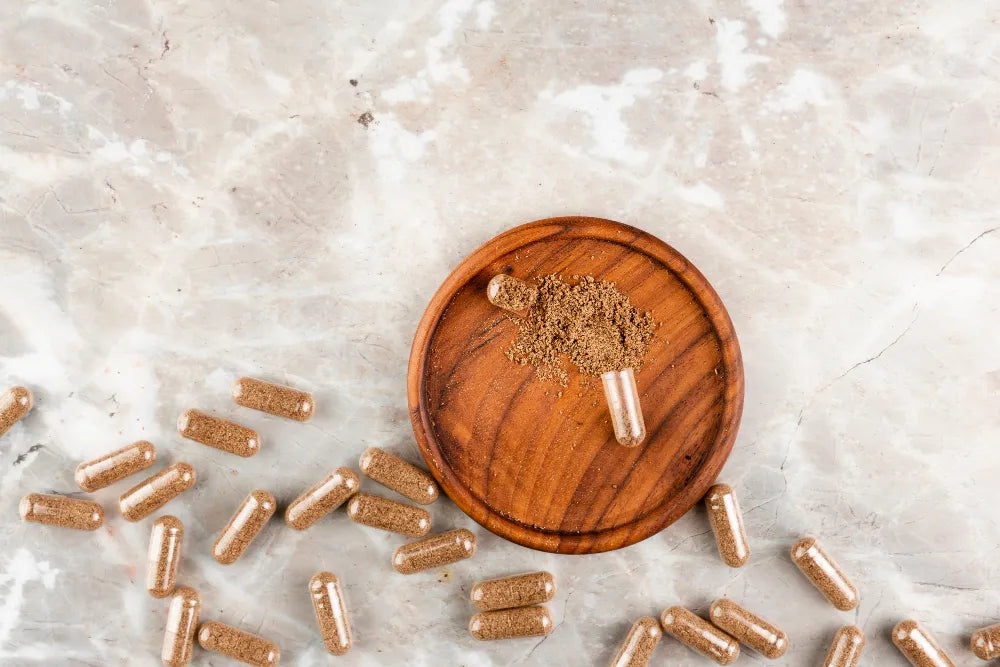
Functional mushrooms have become a mainstay of modern wellness. Among them, lion's mane ( Hericium erinaceus ) and turkey tail ( Trametes versicolor ) stand out for their popularity and complementary properties.
Both are adaptogens with centuries of history in traditional Asian medicine, but their effects on the body are very different. If you're wondering what the difference is between lion's mane and turkey tail , this article explains it clearly, comparing them and offering recommendations based on your goals.
What is turkey tail?
Turkey tail, scientifically known as Trametes versicolor or Coriolus versicolor , is a mushroom with a very characteristic appearance: it forms layers of colors reminiscent of the feathers of a peacock's tail , hence its name.

It has been used for centuries in Asia, especially in China and Japan , where it is known as Yun Zhi or Kawaratake. This mushroom grows on tree trunks and is one of the most studied adaptogens for its ability to stimulate the immune system.
Turkey tail contains bioactive polysaccharides such as PSP (peptide polysaccharide) and PSK (polysaccharide K), compounds that have been widely studied for their potential to stimulate the body's natural defenses. Studies published in the Journal of Ethnopharmacology and in NIH databases have documented their use as a supplement in cancer therapies and for intestinal health.
Main differences between lion's mane and turkey tail
Although both belong to the group of functional mushrooms, their benefits, active compounds, and main effects are distinct. Understanding the difference between lion's mane and turkey tail is key to choosing the right supplement for your needs.

Below is a clear comparison to understand their differences and when each one may be most useful:
|
Lion's mane (Hericium erinaceus) |
Turkey tail (Trametes versicolor) |
|
|---|---|---|
|
Part of the body on which it acts |
Central nervous system and brain |
Immune system |
|
Main compounds |
Hericenones and erinacines |
Polysaccharides PSK and PSP |
|
Highlighted Benefits |
Improves concentration, memory, mood and neuronal regeneration |
Strengthens defenses and helps in recovery processes |
|
Most common form of consumption |
Capsules or concentrated powder |
Liquid extracts or capsules |
|
Flavor and aroma |
Soft, slightly sweet |
Earthy and bitter |
|
Relevant studies |
Cognitive enhancement and anxiety reduction (Frontiers in Pharmacology, 2021) |
Immune Booster and Gut Microbiota (NIH, 2019) |
|
Traditional use |
Chinese medicine for longevity and mental clarity |
Asian medicine as an immune tonic |
|
Ideal for… |
Students, people with mental stress or cognitive fatigue |
People with low defenses or physical recovery |
Each one in detail
Lion's Mane: It's a white, fluffy mushroom with a hair-like appearance, hence its name. Lion's mane derives from its effect on the nervous system and brain. It contains two unique compounds —hericenones and erinacines— that stimulate the production of nerve growth factor (NGF), a key protein for neuronal regeneration and brain plasticity.
Main benefits:
Improves memory, concentration and mental clarity.
Promotes neuronal regeneration.
Contributes to emotional balance and stress reduction.
Supports the connection between the gut and the brain.
If you want to know more about their safety, check out our guide on the contraindications of lion's mane .

Turkey tail: On the other hand, Trametes versicolor stands out for its impact on immunity. It promotes the production of NK (natural killer) cells and regulates the inflammatory response. It also improves intestinal health, as it acts as a prebiotic, feeding the beneficial bacteria in the microbiome.
Main benefits:
Strengthens the immune system.
Promotes intestinal and digestive health.
Helps balance bacterial flora.
It has an antioxidant and cell protective effect.
Which is better: turkey tail or lion's mane?
The truth is that there is no absolute “best” between the two fungi, since they perform different functions within the body.
If your priority is improving concentration , memory, or reducing mental stress, Lion's Mane is ideal. It's a natural nootropic with a gradual and safe effect, perfect for intellectual work or cognitive fatigue.
If, on the other hand, you're looking to strengthen your immune system, protect yourself from infections, or balance your intestinal flora, turkey tail will be your best ally.
In fact, both can complement each other perfectly in a balanced supplement routine: while lion's mane acts on the brain-gut axis, turkey tail strengthens the intestinal barrier and defenses.
Additionally, combining it with other adaptogens, such as reishi, enhances its antioxidant and hormone-balancing effects. You can read more about how it works in our guide to when reishi works .


They are different (and complementary) mushrooms
It is important to emphasize that lion's mane and turkey tail are not the same , nor should they be substituted for each other.
Although both belong to the world of medicinal mushrooms, they have different chemical compositions, mechanisms of action, and purposes.
Lion's mane focuses on the mind; turkey tail, on the immune system. One acts on neurons and the other on immune cells. Both, however, share something in common: their ability to help the body better adapt to physical and emotional stress.
If you are interested in learning more about how these mushrooms fit into modern supplementation, you can visit our introduction to the mushroom supplements: what they are .
Conclusion
The difference between lion's mane and turkey tail goes far beyond appearance or taste. They are two mushrooms with parallel histories, but complementary functions.
Lion's Mane: The Mushroom of Brain Clarity and Neuroregeneration
Turkey tail: the fungus of defenses, energy and intestinal health.
They don't compete, they complement each other. And understanding their differences allows you to consciously choose—or combine—them according to your needs.
Both are part of the new generation of natural adaptogens that help maintain physical and mental balance. The key lies in consistency, the quality of the supplement, and the support of healthy habits : rest, nutrition, and exercise.

